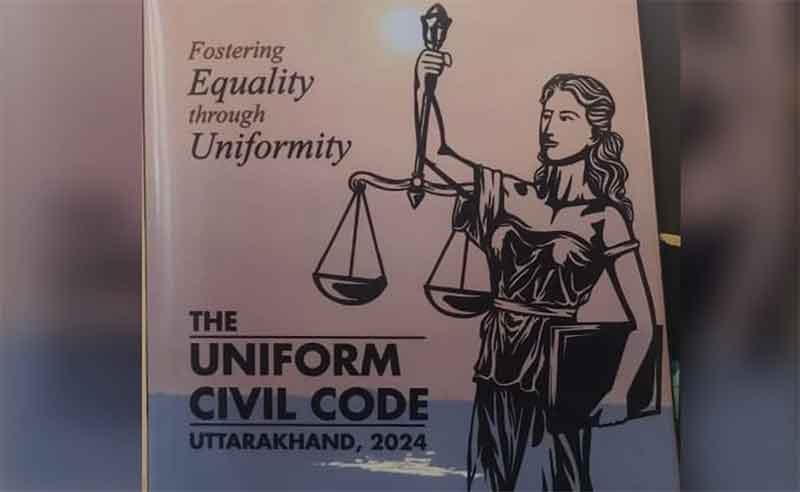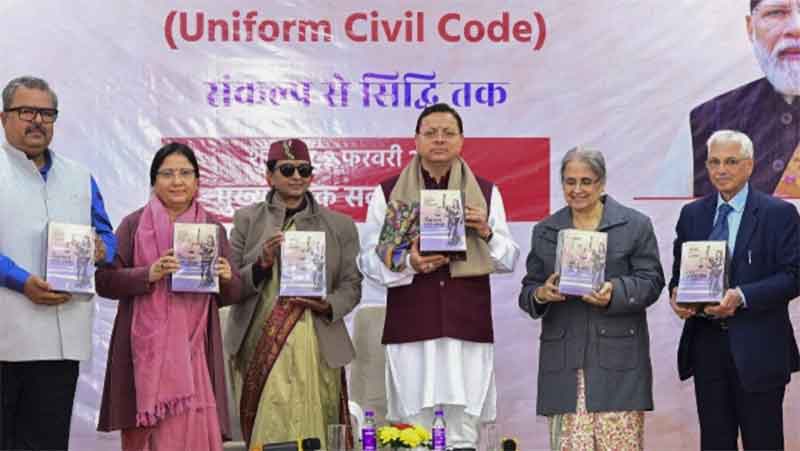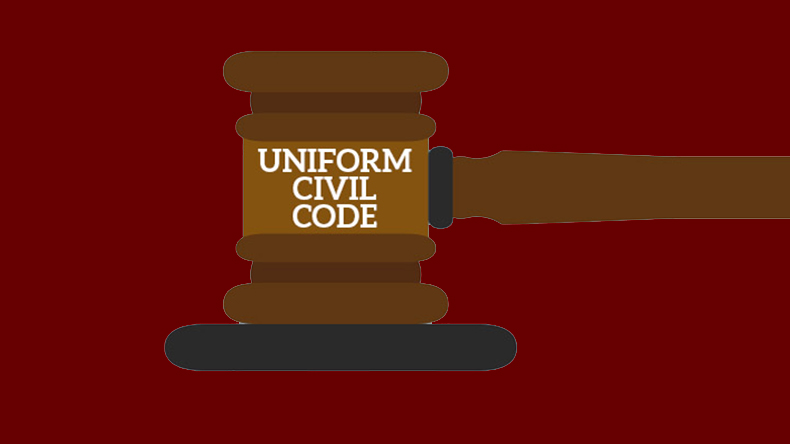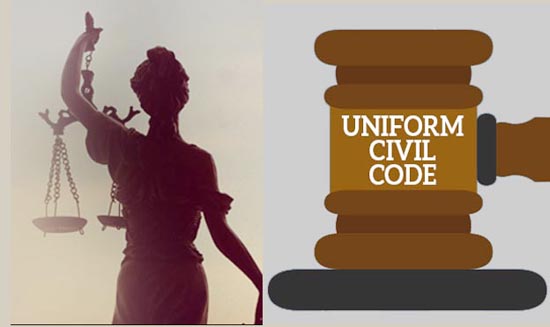
Introduction
The Uttarakhand government, led by Pushkar Singh Dhami, has recently introduced the Uniform Civil Code (UCC), which has sparked considerable opposition from various segments of society. Critics argue that the UCC violates the basic principles of governance, legislation, and democracy. Upon analysing some of the provisions of the Uttarakhand model of UCC, it becomes clear that this legislation is a blatant disregard of the fundamental tenets of a modern welfare state as enshrined in the Constitution of India. Furthermore, it is a direct obstacle to the state’s progress and that of its people, raising serious concerns about the government’s commitment to upholding the rule of law. The UCC that governs personal laws can also be characterised as a flagrant example of the state’s brutality and blatant disregard for the legislative process.
It is widely understood that the law plays a crucial role in maintaining social order, upholding justice and protecting human rights. In this context, the state needs to exercise its sovereign function judicially and with due regard for the fundamental basis of a valid law and core tenets of constitutional values. However, the enactment of laws must also adhere to certain fundamental principles of legislation, including fairness, the rule of law, and the supremacy of the Constitution. In this essay, we explore the Uttarakhand model of the Uniform Civil Code (UCC) and what are the primary imperatives of upholding basic standards of legislation. Additionally, we delve into the philosophical perspectives of Hobbesian positivism and natural law theory, emphasizing their relevance in understanding the essentials of valid law and the significance of incorporating the Law of Nature in statecraft and policymaking.
Destroying the Basic Standards of Legislation
The proposed Uniform Civil Code (UCC) by the Uttarakhand government carries inherent complexities upon analysis of its premises. It aims to cover all aspects of human relationships, which results in disregarding personal liberty, secularism, democracy, constitutional values, the right to live with dignity, and the fundamental right to privacy as provided under Article 21 of the Constitution of India. The UCC endeavours to unify family laws, including issues related to marriage, divorce, registration of the same, conjugal rights, judicial separation, nullity of marriage, maintenance, alimony and custody, intestate and testamentary succession, and live-in relationships, which not only contrary to the basic philosophy of the constitution but also against the principles that must uphold by a civilised state.
The State has the responsibility to legislate based on the collective will and interests of its citizens. However, this sovereign power is limited by considerations of justice, fairness, and the rule of law. The state must adhere to constitutional principles and fundamental rights while exercising its prerogative to legislate. Unfortunately, the Uttarakhand state government has failed to understand the correct interpretation of the right to equality. Equality is not a theoretical concept that requires promotion but rather an ideal that must be implemented in practice. Therefore, all sections of the state population have the right to enjoy their personal laws, but legislations such as the Uniform Civil Code have deprived them of their freedom. It is important to recognize that unequal treatment cannot be justified under the banner of equal treatment.
The principle of the supremacy of the constitution ensures that laws are consistent with the overarching framework of rights and liberties, preventing arbitrary exercises of power. Fundamental to the notion of justice is the concept of fairness. Laws must be impartial, treating all individuals equally before the law. Discriminatory legislation undermines the integrity of the legal system, perpetuating inequality and injustice. Moreover, adherence to the rule of law is indispensable for maintaining societal order and stability. It requires that laws be clear, predictable, and applied consistently, thereby fostering confidence in the legal system and promoting respect for its authority. The way the UCC was introduced just before the general election of 2024, it seems that the whole exercise is to polarise the state aiming to give electoral benefits to the ruling party. Given the above text, it can be safely stated that it is bad law and Hon’ble Supreme Court of India must nullify it through suo moto cognizance.
Examining the UCC through Legal Jurisprudence
The contentious UCC if examined through the lenses of legal jurisprudence, it has failed to convince the primary norms of legal philosophy. Herein, it would be worthwhile to mention Thomas Hobbes’s theory of positivism which emphasized the role of sovereign authority in establishing and enforcing laws. According to Hobbes, the legitimacy of laws derives from the sovereign’s power to impose them, rather than any inherent moral or natural principles. In Leviathan, Hobbes famously wrote, “Covenants without the sword are but words.” This assertion underscores the centrality of sovereign authority in maintaining order and obedience to the law.
Hobbes believed that a social contract between the government and the governed was necessary for the stability and legitimacy of a state. However, Hobbs also recognized that certain basic standards of justice were crucial in upholding this social contract. Hobbes argued that if a law goes against the fabric of society, it must be opposed. Such a law holds no legal sanctity as it disregards the social contract and the tenets of the Constitution. Despite his positivist view of law, Hobbes acknowledged the importance of laws being just and equitable. He asserted that for laws to be valid, they must meet the conditions of the rule of law, equality, and fairness. Only through satisfying these conditions can the laws earn obedience and support from the people. Moreover, Hobbes contended that the Law of Nature, grounded in principles of self-preservation and mutual cooperation, should inform the enactment and execution of laws. The Law of Nature, according to Hobbes, dictates that individuals have the right to defend themselves and their property, but they must also recognize the need for social order and cooperation. Thus, any legitimate exercise of sovereign authority must be guided by the principles of natural law to ensure the welfare and security of the populace.
Implications for Statecraft and Policy
In contemporary Indian politics, the insights of Hobbesian theory have significant implications for statecraft and policymaking and legislations like UCC, Freedom of Religion and Anti-conversions legislations of Uttarakhand, Madhya Pradesh, Uttar Pradesh, and Gujarat etc lack certain merits being valid and just laws. While states retain sovereign authority to enact laws, they must do so by following the principle of justice and the general norms of natural law. Any legislation, policy or programme that infringes upon individual rights or perpetuates inequality is unethical to the spirit of justice and fairness enshrined in the international human rights law and, hence liable to be rejected. Moreover, Hobbes’s emphasis on the Law of Nature underscores the importance of considering broader ethical and moral principles in crafting policies and governance structures. Policies that prioritize the common good and respect for individual rights are more likely to garner legitimacy and compliance from the populace. Additionally, incorporating the principles of natural law into statecraft can help mitigate social conflict and promote solidarity among citizens.
Unique Law that Regulates Personal Freedom
The Uttarakhand model of UCC is an exceptional law, as it is the only legislation in India that considers live-in relationships as a criminal offence. It is worth noting that the Hon’ble Supreme Court of India has already legalized live-in relationships and any form of union between male and female, as well as the rights and freedom of the LGBTQ community, through various verdicts. However, some provisions of the UCC are in contradiction with the Supreme Court’s earlier rulings. Certain provisions of the UCC are not only peculiar but also laughable as they mandate the consent of parents and the registration of live-in relationships under state administration.
The state government lacks minimum information that any imposition of laws that restrict live-in relationships or marriage rights constitutes a violation of fundamental human rights enshrined in international human rights instruments and constitutional frameworks. These include the rights to freedom of association, the right to choose a life partner, the right to marry and also the right to remain unmarried, freedom of privacy, and dignity, as well as the right to equality and non-discrimination. Any law that undermines these rights undermines the very foundation of a democratic society based on the rule of law and respect for human dignity. Furthermore, the criminalization or penalization of consensual adult relationships infringes upon the right to privacy, which encompasses the right to make decisions regarding one’s personal and intimate life free from unwarranted interference by the state or society. Laws that seek to regulate or dictate individuals’ choices in matters of personal relationships violate this fundamental right and undermine the autonomy and dignity of individuals.
Threat to Constitutional Values
Sprawling protests against the contentious UCC can be seen across Uttarakhand, though the hilly state has a tiny minority population largely concentrated around Nainital and Dehradun but all prominent organisations of Muslims and human rights activists have registered their protest in the state against the UCC and its forthcoming ill-effect if implemented throughout the state in a single legislative stroke. Previously, the 22nd Law Commission of India sought the general public views on the desirability of the Uniform Civil Code throughout the country and the commission received massive opposition from all sections of the society as any demand of the UCC in the country will create more divisions than unity. Any attempt to implement the uniform civil code either in any province of India or national level will be boomeranged and may also endanger the unity and integrity of the nation.
It is extremely concerning to witness how the new legislation was introduced. This is a clear indication that the state leadership lacks faith in the core principles of the Indian constitution, which is quite appalling. The state leadership seems to have forgotten that secularism, social justice, equality, and the rule of law are fundamental principles that are crucial for the functioning of modern democratic societies. Secularism ensures that there is a separation between religion and state, thus ensuring religious freedom and neutrality in governance. Social justice, on the other hand, aims to ensure that resources and opportunities are distributed fairly and equitably, addressing historical injustices and marginalization. Equality mandates that all individuals be treated with dignity and afforded equal rights and protections under the law irrespective of caste, creed, language and religion. The rule of law establishes that laws must be clear, consistent, and applied impartially, irrespective of one’s status or identity. Nevertheless, the state enacts a law that targets a particular community and also intrudes on the personal freedom of the individual, it signifies the state has no belief in the idea of India and some of the sacred principles of the modern welfare state.
Dr. B.R. Ambedkar, the chief architect of the Indian Constitution, emphasized the importance of upholding constitutional values and protecting the rights of marginalized communities especially the minorities of India. He famously stated,
that in a parliamentary democracy, minorities must always be won over, and never be dictated to. He said, “In an autocracy where the laws are made by the wishes of a dictator or by an absolute monarch, the art of speaking is unnecessary”. No autocrat, no absolute monarch need pay any attention to eloquence because his will is law. But in a parliament where laws are made, no doubt by the wishes of the people, the man who succeeds in winning our opposition is the man who possesses the art of persuading his opponent. You cannot win over a majority in this House by giving a black eye to your opponent.” Dr Ambedkar’s advocacy for social justice and equality resonates strongly in the context of opposing legislation that targets specific communities, as it reflects a commitment to addressing systemic injustices and promoting inclusivity.
Additionally, the legislation that targets a particular community undermines the core values of anti-discrimination, equality and social justice. The Uttarakhand Uniform Civil Code violates Article 25, read together with Articles 21 and 14 of the Constitution of India. This is because religious, linguistic and cultural minorities have the right to preserve their customs and practices. It is unconstitutional and unethical for state leadership to culturally marginalize a particular religious minority community that is already vulnerable and underprivileged. By endorsing such legislation, state leadership exacerbates disparities and hinders access to opportunities for marginalized communities. Moreover, they violate the principle of equality by treating individuals differently based on their religion, ethnicity or other characteristics. Such legislation also undermines the rule of law by allowing for arbitrary use of power and circumventing legal safeguards meant to protect individual rights.
Conclusion
In conclusion, it is crucial that the state’s sovereign function of enacting laws must be guided by considerations of justice, fairness, and the rule of law. The Hobbesian theory offers valuable insights into the balance between sovereignty and basic standards of justice, emphasizing the utmost importance of valid laws that adhere to principles of equality and fairness. States must incorporate the principles of natural law into statecraft and policymaking to uphold the integrity of the legal system and promote the welfare of their citizens. The legitimacy of laws ultimately rests on their ability to reflect and uphold the fundamental principles of justice and morality, which must be given priority over any other considerations.
Narender Nagarwal teaches at Campus Law Centre, Faculty of Law, University of Delhi














































